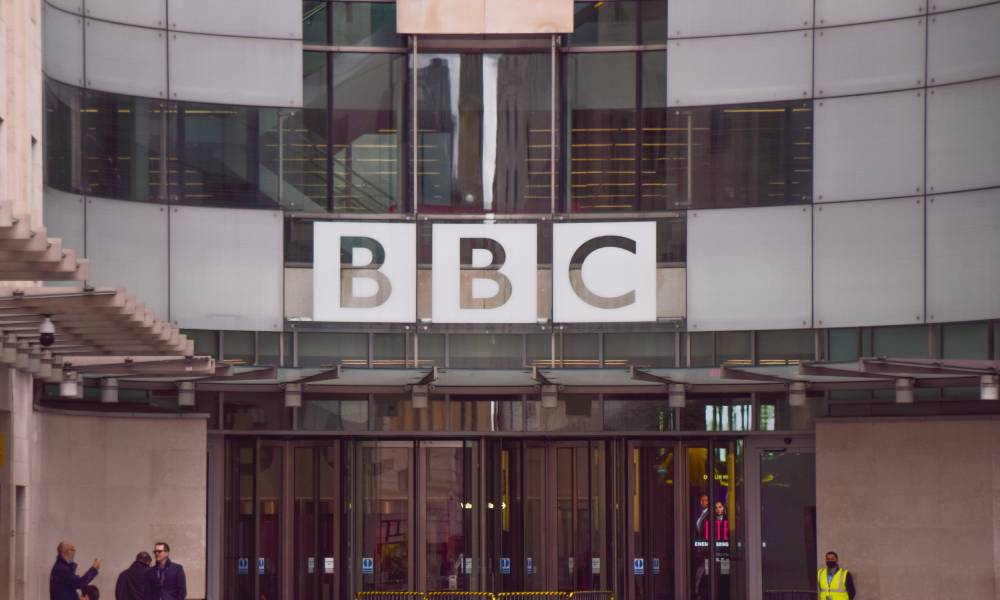Exterior view of Broadcasting House, the BBC headquarters in Central London. (Photo by Vuk Valcic/SOPA Images/LightRocket via Getty Images)
Concerns have been raised over the “censorship” of trans issues after the BBC unpublished a doctor’s heartbreaking fears for young patients in light of last year’s controversial puberty blockers High Court ruling.
The broadcaster said it received several complaints about an article involving the The Tavistock and Portman NHS Foundation Trust, which runs the UK’s only Gender Identity Development Service (GIDS) for young people, seeking leave to appeal a High Court ruling that restricts trans youth from accessing puberty-blocking treatment.
The case was brought by Kiera Bell, a young woman who detransitioned, and Mrs A, who wanted to prevent her teenage child from taking puberty blockers. Lawyers for Bell and Mrs A successfully argued trans youth should be made to obtain a judge’s approval before being able to be prescribed the medication.
However, lawyers for the Tavistock gender clinic have maintained puberty blockers are widely deemed safe, reversible and medically necessary for trans youth. The Tavistock and Portman NHS Trust was granted permission to appeal the High Court ruling in January and a ruling is expected soon after a two day hearing at the Court of Appeal in June.
The original BBC article, which was published in December last year, included the heart-wrenching testimony from doctors, young trans people and their parents about the impact of the initial High Court judgment.
This included contributions from a 14-year-old trans boy, who had attempted to die by suicide, and his mother; the mother of a 12-year-old trans girl who feared her daughter “will not make it” through male puberty; and an unnamed clinician who said she knew of several young trans people who had “tried to take their lives, some successfully”.
The BBC’s Executive Complaints Unit (ECU) said it was “appropriate to reflect genuine concerns about suicide in an article of this kind”. But it concluded the “repeated references to suicide went beyond what was editorially justified in the context”.
As such, it amended the article, and the updated BBC article now does not include the unnamed clinician’s heartbreaking testimony.
The BBC’s ECU also upheld a complaint that the article was “one-sided”. It added that the article should have “done more to reflect the arguments of those who have legitimate reservations about the use of puberty blockers”.
BBC is not ‘speaking or listening to trans people’, says trans charity Mermaids
However, activist Peter Tatchell told PinkNews that suicidal thoughts are a “reality for many trans youth whose gender is not affirmed and who are obstructed in securing gender reassignment treatment”.
“For the BBC to downplay reporting this reality smacks of de facto censorship,” Tatchell added.
“This gives comfort and succour to people who dismiss or make light of the hardships experienced by trans people and the potentially deadly consequences of blocked treatment.”
A Stonewall spokesperson told PinkNews: “It’s always important that media outlets platform trans people’s perspectives, particularly when covering issues that specifically affect them.”
A spokesperson for national transgender charity Mermaids also slammed the BBC edit. The Mermaids’ spokesperson told PinkNews: “The BBC has a deep-rooted issue with transphobia amongst a very small and unrepresentative number of editorial staff, who are skewing coverage in favour of anti-trans viewpoints.
“We ask the BBC to alter its position of not speaking to or listening to trans people in their coverage of these highly sensitive issues.”
The High Court ruled in December 2020 that trans people aged under-16 cannot give informed consent to puberty blockers, hormone replacement therapy (HRT) and gender-affirming therapy to be prescribed puberty-blocking treatment. The court said it was “highly unlikely” under 13s would be competent to give consent and was “doubtful” under 15s could understand the “long term risks and consequences”.
In March, however, the High Court ruled that a “loving parent” can consent to a child taking puberty blockers, in part reversing last year’s decision in the Keira Bell case.
The case hinged on whether under-16s can give informed consent to puberty blockers which are currently the only medication available to trans under-16s experiencing gender dysphoria. Youth aged 17 and 18 who have been taking puberty blockers for at least a year are eligible for hormone replacement therapy (HRT).
Fenella Morris QC for the NHS told the Court of Appeal that forcing trans youth to get the court’s permission to take puberty blockers “adds to the court’s burden” in cases where patients, doctors and parents all agree that puberty blockers might be the right treatment.
Morris added that gathering the court’s permission would also be “unimaginably stressful for families”.
In March, Dr Jay Stewart, CEO and co-founder of Gendered Intelligence, said the High Court’s decision had a huge impact on the mental wellbeing of trans youth. Stewart said young trans people told Gendered Intelligence that they feel a “lack of control” over their lives as a result of the judgement.
“Young trans people have described it as offensive that they do not have appropriate autonomy over their bodies and their choices,” he said.
Stewart described how some young people said the judgement has “made them feel that the world hates me”.
In 2020, a study, published in the medical journal Pediatrics, found puberty blockers can be “life-saving” for trans teens. The study found access to puberty-blocking medication for trans teens who want them reduces the likelihood of trying to die by suicide in both the short and long term. It also found access to puberty blockers reduced the likelihood of trans teens experiencing mental-health problems.
The BBC declined to comment. PinkNews has also contacted the Tavistock and Portman NHS Trust gender identity for comment.
Suicide is preventable. Readers who are affected by the issues raised in this story are encouraged to contact Samaritans on 116 123 (www.samaritans.org), or Mind on 0300 123 3393 (www.mind.org.uk).
Readers in the US are encouraged to contact the National Suicide Prevention Line on 1-800-273-8255.
